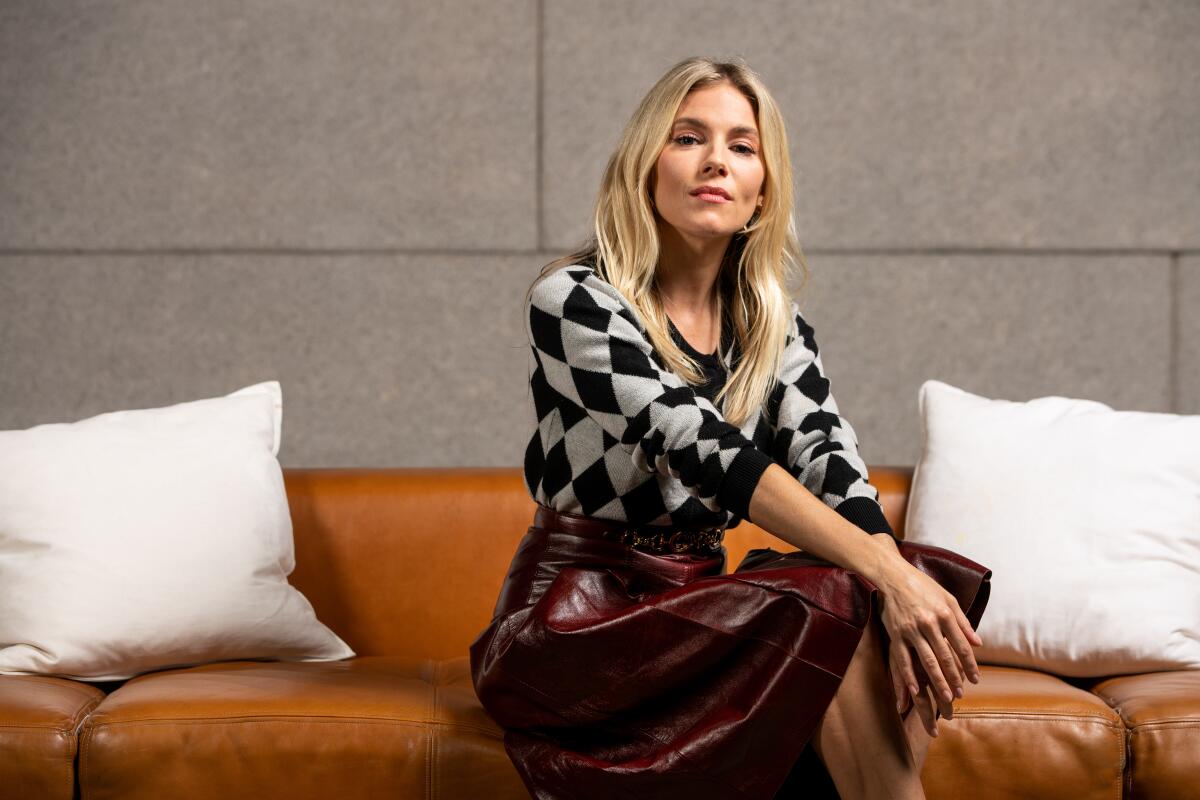Sienna Miller carries the weight of her little-seen ‘American Woman’

- Share via
Sienna Miller’s eclectic array of performances in an equally unpredictable swath of studio and independent films and TV projects (she’s also an accomplished stage actress) may make the busy British American performer hard to pigeonhole but also an exciting talent to watch.
This is particularly apparent in the well-reviewed, if under-seen indie drama “American Woman,” directed by Jake Scott (Ridley’s son) from a script by Brad Ingelsby.
As Deb Callahan, a provocative, working-class, single mother in a small, blue-collar Pennsylvania town, Miller carries the weight of the gritty family drama. When Deb’s 16-year-old daughter, Bridget (Sky Ferreira), goes missing, Deb is left to raise her young grandson and navigate the many tribulations that follow.
Miller, 37, proved a warm, poised and reflective presence on a recent visit to Los Angeles.
Is it safe to say that, for all your roles, you’ve never portrayed someone quite like Deb?
I don’t think anyone as kind of garish, though I really loved that about her. I also knew that people would judge that. And I kind of loved that as well. I wanted to work with that judgment. What I admire in [characters like Deb] is their ability to be themselves and you understand psychologically where it’s coming from — having been judged, having been misunderstood. At a certain point, in a kind of masochistic way, they welcome judgment — because what else do you expect them to do?
Did you channel any specific parts of your own personality in creating Deb?
I may have had that feeling in myself at certain points where I felt so misunderstood that I just became rebellious, though never as extreme. But [unlike Deb] I always cared what people thought.
Deb changes so much over the course of the 11 years the film depicts: from brassy and defiant to more responsible and measured. Was that a tough arc to manage?
Well, because we didn’t shoot in sequence, there were moments where I’d literally have to flip between Debs. There were days where I was different iterations of her, which just required an enormous amount of prep.
Deb’s poor choices in men — the married Brett, the abusive Ray, the seemingly more reliable Chris — kind of shape her character and others’ impressions of her. What do you think drives her choices?
At the beginning, I think she’s not really cognizant. And there’s probably something in her that’s avoiding deep commitment. She probably also doesn’t have much self-respect. Hence that decision [to be with Brett], I think, is made on a deep psychological level.
I think with Ray, by that point, she’s been through this trauma [with Bridget], and I think she’s sort of a walking ghost. She’s just trying to get through the next day and be strong for her grandson — and with no financial support. And when Ray reveals himself to be very abusive, she’s just broken.
When she meets Chris, to put herself in a position where she can trust somebody is terrifying. And obviously she really fights that at first and pushes it away — and then just jumps in.
On the other hand, the relationship between Deb and her sister, Kath (Christina Hendricks), is so supportive and lovely, even when things get a little crazy.
What was clear in the script — and was just very real — was this huge sense of history. We worked on that in rehearsal: what their dynamic was, how the baby sister can tend to be more rebellious than the big sister, how the big sister is automatically a little bit parental. You feel all of this complication between them, but their deep, deep love was essential. I think that their relationship is the beating heart of the film.
What about Deb’s eastern Pennsylvania accent? You really nailed that.
The accent’s really specific. I found it incredibly difficult at first because to me, as an English person, it sounded very [American] Southern, but it’s not. Southern is easier. I always begin with the voice. And I think that once that really lands and becomes kind of ingrained, then everything else can fall into place much easier. I worked with an incredible dialect coach [Wendy Overly].
What’s the difference for you between making a smaller, lower-budget indie film versus a bigger, studio movie?
Character is really what I’m interested in. I think on bigger movies that are less character-driven it’s about something else. The conversations are not as in-depth. I do like independent film a lot because I know everybody’s there for the right reason. It’s a labor of love. You’re doing it because there’s something in it you want to explore. My incentive is always: Have a good time, do deep work, hope for the best.
More to Read
Only good movies
Get the Indie Focus newsletter, Mark Olsen's weekly guide to the world of cinema.
You may occasionally receive promotional content from the Los Angeles Times.










